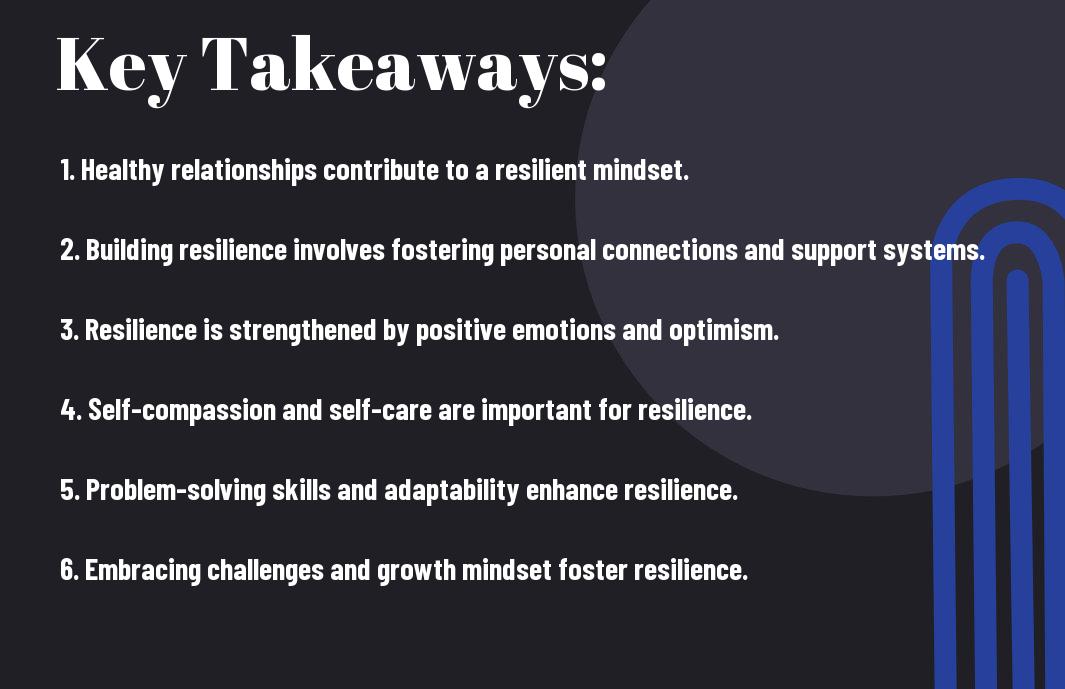Why is Resilience Important For an Entrepreneur?
It’s widely acknowledged that a resilient mindset is crucial for navigating life’s challenges and setbacks. But what role do healthy relationships play in cultivating this resilience? Research suggests that strong interpersonal connections are indeed key to developing a robust capacity for bouncing back from adversity. In this blog post, we will explore the importance of healthy relationships in building a resilient mindset and research into the seven vital keys that can help foster resilience in individuals.
Key Takeaways:
- Healthy relationships are crucial for developing a resilient mindset. Nurturing positive connections with others can provide support, perspective, and a sense of belonging, which are vital for overcoming challenges.
- Resilience involves adapting to adversity and bouncing back from setbacks. It is a skill that can be developed and strengthened over time with practice and self-awareness.
- The 7 keys to resilience include:
- Self-awareness – Understanding your emotions, thoughts, and behaviours.
- Self-regulation – Managing stress and controlling impulses.
- Optimism – Maintaining a positive outlook and mindset.
- Mental agility – Being adaptable and open to change.
- Strengths of character – Leveraging your strengths and virtues.
- Connection – Building relationships and support networks.
- Meaning – Finding purpose and significance in your experiences.
- Cultivating resilience is a continuous process that involves building and strengthening these key factors in your life. Developing resilience can help you navigate challenges, grow from setbacks, and thrive in the face of adversity.
- Building a resilient mindset can help individuals cope with stress, overcome obstacles, and achieve personal growth and success in various areas of life. By prioritizing healthy relationships and practising the 7 keys to resilience, individuals can enhance their ability to bounce back from difficulties and thrive in the long run.


The Link Between Healthy Relationships and Resilience
Emotional Support and its Impact on Resilience
There’s no denying the powerful impact that healthy relationships, especially in the form of emotional support, can have on one’s resilience. When individuals have a strong support system in place, they are better equipped to navigate through life’s challenges and bounce back from setbacks. Emotional support from friends, family, or a partner can provide a sense of comfort, validation, and encouragement, boosting one’s ability to cope with stress and adversity.
The Role of Social Networks in Overcoming Adversity
Linking back to the significance of healthy relationships, social networks play a crucial role in building resilience and overcoming adversity. Whether it’s through online communities, support groups, or close-knit friendships, the connections we form with others can serve as a valuable source of strength and perspective during tough times. By fostering positive relationships within our social circles, we can enhance our ability to adapt, problem-solve, and thrive in the face of challenges.
The support and camaraderie found within social networks can serve as a buffer against the negative impacts of stress and adversity. When individuals feel connected to others and have a sense of belonging, they are more likely to feel empowered and capable of facing life’s obstacles head-on. Social networks not only offer emotional support but also provide valuable resources, advice, and different perspectives that can help individuals navigate through difficult times with resilience and determination.
The 7 Keys to Resilience
Developing a Positive Attitude
Developing a positive attitude is imperative for building resilience. It involves maintaining an optimistic outlook even in the face of adversity. By focusing on the silver linings and possibilities for growth in challenging situations, individuals can cultivate a mindset that is better equipped to handle setbacks and bounce back stronger.
Embracing Change as an Opportunity
Embracing change as an opportunity is another key aspect of resilience. Change is inevitable, and instead of resisting it, resilient individuals embrace it as a chance for personal and professional growth. By viewing change as a potential opportunity to learn, adapt, and evolve, individuals can navigate transitions more effectively and come out stronger on the other side.
A positive mindset is crucial when it comes to embracing change as an opportunity. By choosing to see change as a chance for growth and transformation, individuals can approach challenges with a sense of curiosity and openness, ultimately expanding their resilience and capacity to thrive in the face of uncertainty.
Implementing the Keys to Resilience in Relationships
Communication and Resilience
Keys to a resilient relationship include open and honest communication. This involves expressing emotions, thoughts and needs effectively while listening actively to your partner. Effective communication can help resolve conflicts, build trust, and deepen the connection in the relationship.
Trust and Mutual Support
To cultivate trust and mutual support in a relationship, it is vital to demonstrate reliability, honesty, and empathy towards your partner. Trust is the cornerstone of a resilient relationship, providing a sense of security and comfort during challenging times. Mutual support involves being there for each other emotionally, physically, and mentally, offering a strong foundation for resilience.
Communication and trust are intertwined in resilient relationships. Effective communication builds trust, while trust enhances communication. When both elements are nurtured and prioritized, relationships can weather storms and thrive in the face of adversity, strengthening the foundation of a resilient mindset.
Applying Resilience Beyond Personal Relationships
Resilience in the Workplace
To thrive in today’s fast-paced work environments, individuals must cultivate resilience to navigate challenges effectively. From managing heavy workloads to handling conflicts with colleagues, resilience in the workplace is crucial for maintaining mental well-being and productivity. Organizations can support employees by promoting a positive work culture, providing resources for stress management, and fostering open communication channels for addressing concerns proactively.
Building Resilient Communities
Resilience extends beyond individuals and workplaces to encompass entire communities. Building resilient communities involves creating networks of support, fostering cooperation among diverse groups, and developing emergency response plans to address crises effectively. By promoting social connections, investing in infrastructure for sustainability, and cultivating a sense of belonging among residents, communities can enhance their capacity to bounce back from adversity and thrive in the face of challenges.
Applying the principles of resilience to a broader context helps create a stronger foundation for individuals, workplaces, and communities to overcome obstacles and adapt to change. By developing skills such as problem-solving, emotional regulation, and effective communication, individuals can contribute to creating resilient environments that promote well-being and growth for all members.
Conclusion
Taking this into account, healthy relationships are indeed the foundation of a resilient mindset. The 7 keys to resilience – self-awareness, mindfulness, self-care, flexibility, adaptability, purpose, and connection – all tie back to the importance of fostering strong and supportive relationships in our lives. By cultivating these relationships, we empower ourselves to navigate challenges with courage, strength, and grace, ultimately leading to a more resilient mindset that can weather any storm.
FAQ
Q: Why are healthy relationships important for a resilient mindset?
A: Healthy relationships provide support, comfort, and a sense of belonging, which are crucial for building resilience in individuals. Having strong relationships can help people navigate through challenges and setbacks more effectively.
Q: What are the 7 keys to resilience?
A: The 7 keys to resilience are self-awareness, mindfulness, self-care, positive relationships, problem-solving skills, emotional regulation, and optimism. These factors work together to help individuals bounce back from adversity and develop a resilient mindset.
Q: How does self-awareness contribute to resilience?
A: Self-awareness is the ability to recognize and understand your emotions, thoughts, and behaviours. By being self-aware, individuals can better cope with stress, regulate their emotions, and make positive choices that enhance their resilience.
Q: Why is emotional regulation important for resilience?
A: Emotional regulation involves managing and controlling your emotions in response to challenges and stressors. By practising emotional regulation, individuals can prevent overwhelming feelings from derailing their ability to bounce back from setbacks and cultivate a resilient mindset.
Q: How can positive relationships strengthen resilience?
A: Positive relationships provide emotional support, encouragement, and a sense of connection that are crucial for resilience. Building and nurturing relationships with supportive individuals can boost confidence, reduce stress, and enhance coping mechanisms during difficult times.